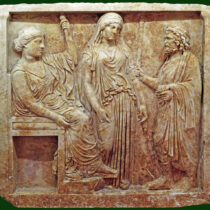This paper examines some of the meanings and values associated with women’s cleanliness and beauty care in the context of rural Greek “traditional” culture and of an urban way of life as it emerged during the 1960s. Women’s preoccupation with the cleanliness and beautification of the house is well documented in the ethnographic literature on rural Greece. In contrast,a woman’s concern with her own bodily cleanliness is hardly mentioned. Clearly such concern does not appear to be a positively valued aspect of womanhood. In fact, far from being a compliment, the claim that a woman is “clean” (παστρική), that she washes herself too frequently, amounts to an insinuation that she is susceptible to sexual improprieties.
Where perceived as excessive,a woman’s preoccupation with bodily cleanliness may be condemned as a violation of the priority that must be always given to the care of home and family. The image of a whore who is bathing while the world around her is burning, may be used for a woman who neglects her duties, as well as for a man who engages in insignificant or frivolous pursuits at the expense of important ones. In addition, a woman’s concern over bodily cleanliness may represent moral faultiness, as frequent washing presupposes dirtiness resulting from polluting sexual encounters and/or indicates readiness for such. In contrast, the washing of the body is especially appropriate to occasions highlighting women’s membership in the family and the community as daughters and prospective or actural wives and mothers. Women’s efforts to
improve their appearance with the help of products and services increasingly available in the urban markets in 1960s also seem to have been evaluated according to similar criteria. As means to further a woman’s marriage prospects or to add to her husband or father’s prestige, they are condoned. Otherwise they are condemned as signs of vanity or moral faultiness. In addition, despite the admiration she may arouse for being attractive, a woman who appears to use beauty products and services extensively, may also be suspect of trying to conceal a physical defect, or of hiding a dirty body underneath fancy hairdos and cosmetics. Thus, the image of an attractive, beautified woman may represent deceit. In contrast, women’s bodily cleanliness is valued increasingly positively, because it is associated with hygiene and with a higher, more “European” standard of living. Also, because it is contrasted with the pursuit of a sort of beauty perceived as artificial.


